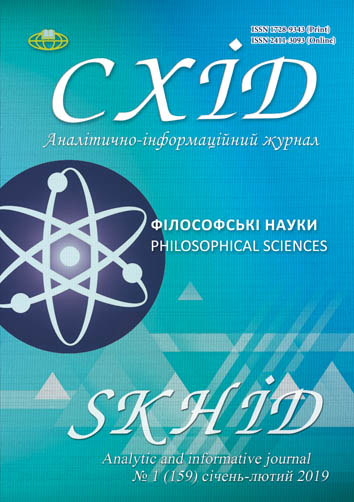Hermeneutics H.-G. Gadamer as a universal philosophy of understanding
DOI:
https://doi.org/10.21847/1728-9343.2019.1(159).157988Keywords:
hermeneutics, understanding, interpretation, language, semantics, platonismAbstract
Considered the hermeneutic project of H.-G. Gadamer as the final phase of the development of the circle of ideas of the German philological hermeneutics of the ХІХ-ХХ century. The philosophy of language and the doctrine of understanding and interpretation are explored in connection with the development of philological ideas within the framework of the phenomenological school. The relationship between Gadamer’s position and representatives of various linguistic theories of the early twentieth century is shown. The concept of understanding is presented as a key element of the hermeneutic process. Gadamer’s hermeneutics is analyzed in the context of his conservative position and his interpretation of Platonic philosophy. Formation of the circle of ideas that formed the basis of the philosophical hermeneutics of H.-G. Gadamer is an integral part of the notion of the essence of language and understanding of its role in the formation of meaning and the entire spiritual culture of mankind, as well as from the concepts of human personality, its creation and development. Consideration of such issues is fundamental to revealing the real role that the hermeneutic project has played and continues to play in the development of European philosophy. The relevance of the theme chosen is determined by the role that the philosophical project of H.-G. Gadamer plays in the development of contemporary ideas about the importance of humanitarian knowledge and, above all, philosophy in the formation of man as such. Gadamer’s philosophical hermeneutics with the passage of time only increases its importance for the development of philosophical discourse, thereby confirming its great euristic potential. As in modern Ukrainian philosophy, the development of the problems of understanding, first of all, understanding of the semantic component of human activity in the most diverse fields - from the sphere of art to political discourse, has become more relevant than ever. But in our day one can observe some limitations in understanding the significance and relevance of the Gadameric heritage, the study of which is often of a formal nature; the thinker himself and his works are referred to as a kind of ‘figure of contention’, without the necessary reflection and further development.
Downloads
References
Gadamer, H.-G. (1988). Istina i metod: Osnovy filosofskoy germenevtiki. Transl. from Germ. Moscow: Progress, 704 p. (In Russian).
Gromov, R. A. (2004). Anton Marty. Filosofiya yazyka brentanovskoy shkoly. Predisloviye k publikatsii. Logos, 1 (41): 106-137 (In Russian).
Marty, A. (2004). Ob otnoshenii grammatiki i logiki. Transl. from Germ. Logos, 1 (41): 138-168. Retrieved from http://www.ruthenia.ru/logos/number/41/08.pdf (In Russian).
Shpet, G. G. (2005). Germenevtika i yeye problemy. Mysl i slovo. Izbrannyye trudy. Moscow: ROSSPEN: 248-469. Retrieved from http://old.kpfu.ru/f4/bin_files/40.doc (In Russian).
Gadamer, H.-G. (1977). Kleine Schriften. Ed. 4. Tübingen: 256-261 (In German).
Gadamer, H.-G. (1990). Collected Works. Vol. 1. Hermeneutics I. Truth and Method., 494 p. (In German).
Gadamer, H.-G. (1985). Collected Works. Vol. 6. Greek philosophy. Tübingen, J.C. B. Mohr (Paul Siebeck), 341 p. (In German).
Gadamer, H.-G. (1991). Collected Works. Vol. 7. Plato in dialogue. Tübingen, J. C. B. Mohr (Paul Siebeck), 445 p. (In German).
Heidegger, М. (2006). Being And Time. (9 ed.) Tübingen: Max Niemeyer Verlag, 445 p. (In German).
Heidegger, M. (1967). Plato's doctrine of the truth. Frankfurt am Main: Vittorio Klostermann (In German).
Marty, А. (1875). About the origin of the language. Berlin, 192 p. Retrieved from https://archive.org/details/ueberdenursprun00martgoog/page/n8 (In German).
Marty, А. (1908). Investigations on the foundation of the general grammar and philosophy of language. Prague, 345 s. Retrieved from https://archive.org/details/untersuchungenzu01martuoft/page/n4 (In German).
Steinthal, H. (1851). The origin of language in connection with the last questions of all knowledge. Berlin. Retrieved from https://archive.org/details/derursprungders00steigoog/page/n12 (In German).
Steinthal, H. (1871). Demolition of linguistics. Vol. I: Introduction to Psychology and Linguistics). Berlin, 362 s. Retrieved from https://books.google.com.ua/books/about/Einleitung_in_die_Psychologie_und_Sprach.html?id=NM7fAAAAMAAJ&redir_esc=y (In German).
Downloads
Published
How to Cite
Issue
Section
License
Copyright (c) 2019 Vira Dubinina

This work is licensed under a Creative Commons Attribution-NonCommercial-NoDerivatives 4.0 International License.
1. Authors bear responsibility for the accuracy of facts, quotations, numbers and names used.
2. Manuscripts are not sent back.
3. The publisher does not always agree with the authors' opinion.
4. The authors reserve the right to authorship of the work and pass the first publication right of this work to the journal under the terms of a Creative Commons Attribution-NonCommercial-NoDerivatives 4.0 International License. This license allows others to distribute (copy) the published work for non-commercial purposes, provided there is mandatory attribution to its authors and a link to the first publication in our journal.
5. The authors have the right to conclude separate supplement agreements that relate to non-exclusive work distribution in the form in which it has been published by the journal (for example, to upload the work to the online storage of the journal or publish it as part of a monograph), provided that the reference to the first publication of the work in this journal is included.

